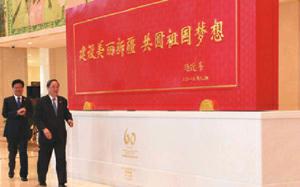Xinjiang Celebration
2015-10-22
Yu Zhengsheng (right), Chinas top political advisor, and Zhang Chunxian, Secretary of Xinjiang Uygur Autonomous Regional Committee of the Communist Party of China, unveil a plaque inscribed with Chinese President Xi Jinpings words “building a beautiful Xinjiang, accomplishing the motherlands dream together” in Urumqi, capital of Xinjiang Uygur Autonomous Region, on September 25.
Yu, Chairman of the National Committee of the Chinese Peoples Political Consultative Conference, was leading a central government delegation to attend festivities marking the 60th anniversary of the establishment of Xinjiang Uygur Autonomous Region from September 25 to October 1.

Monetary Policy
The Peoples Bank of China (PBC), the central bank, said on September 25 that it would maintain continuity and stability regarding its monetary policy.
Going forward, the PBC will continue with a prudent monetary policy and focus more on striking a balance between tight and loose, it said in a statement after a meeting regarding the third quarter.
The central bank will employ multiple monetary policy tools to maintain“moderate” liquidity and achieve proper expansion in credit and social financing, according to the statement.
It added that the PBC will continue financial reforms directed at improving efficiency and try to lower financing costs.
Efforts will be made to promote interest rate liberalization, improve the renminbi exchange rate mechanism and keep the renminbi exchange rate relatively stable, the statement said.
Innovation Plan
China issued a national plan for national science development on September 24, giving academics and inventors more incentives.
The plan, constructed by the General Office of the Central Committee of the Communist Party of China and the General Office of the State Council, introduces mechanisms to motivate researchers and foster innovation with 32 specific measures.
Technological innovation should be more market-oriented, with a mechanism to commercialize research findings, the plan said.
It also stated that current evaluation mechanisms should be overhauled to allow capital investors to be proactive in inspiring new research and applied technology.
Internet of Things
The value of Chinas Internet of Things(IoT) industry reached 580 billion yuan($91 billion) in 2014, a yearly increase of 18.46 percent, said a recent report.
The IoT, which connects traditional devices, including home appliances, to the Internet, has become a powerful driving force behind innovation and economic growth in China, said the report issued by Xinhua News Agency at an IoT expo in Wuxi, east Chinas Jiangsu Province, on September 24.
The report said that Chinas IoT technologies have continued to work beside traditional industries like agriculture and manufacturing and emerging industries such as new energy and new materials.
China has built four IoT industry centers in the Yangtze River Delta, Pearl River Delta, Bohai Rim, and central and west China, with the Yangtze River Delta taking the lead in terms of industrial scale.
The report also listed major challenges facing Chinas IoT, including its reliance on the importation of sensor and chip technology as well as problems involving application, information and data security.
SOE Reform
The State Council has issued a new set of guidelines urging state-owned enterprises (SOEs) to accept mixed ownership and modernize as it bids to streamline these lumbering behemoths.
SOEs must improve their management through market-oriented reform while adhering to government guidance, according to the guidelines, released on September 24.
As SOEs face increasing international competition, China is trying to attract private investors who are seeking revitalization. However, state capital should maintain “the position of absolute control,” especially in fields relating to national security, said the guidelines.
China has about 150,000 SOEs, holding more than 100 trillion yuan($15.7 trillion) in assets and employing over 30 million people. But they posted a 2.3-percent decline in profits in the January-July period, attributed to outdated mechanisms and poor management.
Prehistoric Ruins Park
Construction has started on a park at the site of ancient human ruins in southwest Chinas Tibet Autonomous Region, local authorities said on September 25.
The Karub Ruins Park, located in Qamdo, will allow visitors to learn about the plateaus prehistoric civilization, according to Yungzhung Dawa, head of the citys Cultural Heritage Bureau.
With a total investment of 120 million yuan ($18.82 million), the project will replicate Tibetan scenes of the past that could reach back as far as 5,000 years.
The first-phase project includes an exhibition hall where pictures of the ruins of ancient houses will be displayed.
The Karub ruins were discovered in 1977 and put under state protection in 1996. Three excavations have been conducted on an area covering 3,040 square meters since their discovery. The site marks the best-preserved Neolithic ruins on the Qinghai-Tibet Plateau.
Securities Offense
Chinas securities regulator said on September 25 that it had dealt out punishments in nine cases of securities market violations, including insider trading, market manipulation and the spread of false information.
The China Securities Regulatory Commission (CSRC) imposed fines totaling 22.23 million yuan ($3.49 million) on two corporate legal representatives and 25 individuals involved in the cases, according to a statement on the CSRCs website.
In three cases, four people were penalized for profiting from stock trading based on insider information gained from listed company management, the statement showed.
Other violations involved the disclosure of inaccurate or false information by listed companies and manipulating the futures market.
Harvest Season
A dealer selects hairy crabs on the Hongze Lake at a market in Hongze County, Jiangsu Province, on September 25.
The Hongze Lake is famous for its excellent water quality, which produces quality hairy crabs with green-blue carapace, snow-white bellies and golden hair on their legs and pincers.
Goal!
British Chancellor of the Exchequer George Osborne visits a soccer school in Urumqi, capital of northwest Chinas Xinjiang Uygur Autonomous Region, on September 23.
Osborne was in China for the Seventh China-UK Economic and Financial Dialogue held in Beijing two days earlier. At the event, co-chaired by Chinese Vice Premier Ma Kai and Osborne, China and Britain reached 53 agreements in areas such as nuclear energy, high-speed railways and finance.
Lottery Sales
Chinas lottery sales amounted to 28.09 billion yuan ($4.41 billion) in August, down 10.9 percent year on year, official data showed.
The first eight months of 2015 saw sales of lottery tickets worth 242.82 billion yuan ($38.1 billion), a year-onyear drop of 1.8 percent, the Ministry of Finance (MOF) announced.
Welfare lottery sales increased by 0.4 percent year on year to reach 133.4 billion yuan ($20.93 billion) in the first eight months, while the sports lottery dropped 4.2 percent to hit an amount around 109.4 billion yuan ($17.16 billion), MOF data showed.
Under lottery management rules, money from ticket sales must cover administrative fees and public welfare projects in addition to the jackpot.
